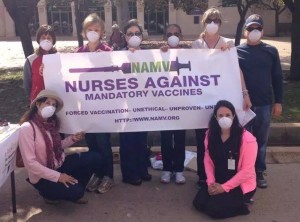The Truth Behind Flu Shot Mandates for Healthcare Workers
By Claire Dwoskin
When you are sick, injured or just need a check-up, you trust that your doctor is giving you valid, conflict-free, evidence-based advice on what is best for your health. The last thing you want to believe is that your doctor is putting a drug company’s interests, or their own, over your health.
What if you discovered that the flu vaccine, or any vaccine, is being given to you or your child without your consent or knowledge, or to a loved one in the hospital at a time when it is contraindicated for his or her condition? What if you learned that your health care providers were, themselves, force-vaccinated against their better judgement just to stay employed? What if these policies were ultimately driven by financial incentives for those who make and enforce them?
The following answers, interspersed with personal stories I have heard directly from parents, patients and healthcare workers, will have you questioning the next time you are faced with vaccine decisions. Protecting your loved ones and your right to informed consent when it comes to any medical procedure that carries with it the risk of injury or death depends on YOU doing your own research. An informed and educated healthcare consumer is the best protection against becoming a statistic in the epidemic of eroding national health.
Uncovering the Facts Behind Mandatory Flu Vaccines for Healthcare Workers
Dr. Meryl Nass, M.D., a 36-year career board certified internal medicine practitioner in Maine, has written extensively about vaccine safety and vaccine policy. She is most well-known for her work with hundreds of Gulf War Veterans who became ill after receiving the anthrax vaccine. Her most recent research has uncovered new information about a nationally imposed flu vaccine policy for healthcare workers. This policy also affects patients at hospitals and in pediatric practices, and general practitioners who are being lobbied, cajoled and sometimes deceived into getting flu vaccines.
Dr. Nass discovered that the Quality Improvement Organizations (QIOs established by Medicare and organizations like the National Quality Forum, a federally established, public-private health quality assessment organization are created for the purpose of enforcing policies that are selected as “quality improvement” measures, whether or not they improve care or lower costs. They are surrogate measures that can then be used to get institutions to either comply or lose millions of dollars in reimbursements (up to 4% of acute care hospitals’ total Medicare reimbursements). The more employees and patients vaccinated, the higher the reimbursement rate.
In a recent article, Dr. Nass described the complaint and resulting settlement of seven health care workers in Erie, PA who were fired for refusing flu vaccines for religious reasons. They won an EEOC settlement of $300,000 which requires them to be reinstated and receive back pay and compensatory damages for alleged religious discrimination.
The following is an excerpt from a local newspaper that covered the story:
The commission had claimed Saint Vincent violated Title VII of the Civil Rights Act of 1964 when it fired the six workers, who refused to be vaccinated after the hospital implemented a mandatory flu vaccination policy for all employees. The hospital granted medical exemptions to 14 other workers.
The bottom line is that the federal government squeezed hospitals by requiring hospitals to report the rates of yearly influenza vaccinations of both hospital staff and hospital patients, including these two measures in a global calculation of hospital ‘quality.’ A hospital’s ‘quality’ number determines approximately 3.75% of its overall Medicare reimbursements rate in 2017 (with yearly adjustments to this number). In the healthcare industry, 3.75% is enough to make a hospital sink or swim. The hospitals, predictably, acquiesced by demanding their employees be vaccinated or fired.
This is evidently not so much a health policy, but a transactional policy: mandates are being forced upon employees so that hospitals will reap financial gain. Simply put, your practitioners’ health and autonomy are being used as a bartering tool to increase Medicaid and Medicare reimbursements, which can determine whether a hospital has a profit and loss when margins are slim.
Personal Story #1: Hospital Owner Understands Danger of Flu Vaccine But Keeps Policy Anyway for Funding
While at dinner one evening with a friend who owns five small hospitals, we discussed flu vaccines. He mentioned that he had required all of his employees to be vaccinated and he, likewise, took the flu vaccine. Following the mandate, he noticed he was having the highest employee absentee rate ever since owning the hospitals. He presumed that his employees had gotten sick after getting vaccinated.
Why? The hospital owner described becoming terribly ill right after getting his flu vaccine. In retrospect, he wondered why he needed it since he had never gotten the flu before getting the vaccine. He decided the following year that, despite continuing to require that his employees be vaccinated, he would no longer take the risk himself.
Guess what? He continued to notice high absentee rates but he remained healthy that winter. His name and hospital system will remain anonymous, but his experience was not isolated. I have heard from other high level hospital personnel that they also opt out of the flu vaccine.
Who is/are Behind the Flu Vaccine Mandates?
The CDC, already suffering credibility woes on a variety of issues, has another to add to the pile. On their website, they deny they are directly issuing the flu vaccine mandates:
CDC does not issue any requirements or mandates for state agencies, health systems, or health care workers regarding infection control practices, including influenza vaccination. There are no legally mandated vaccinations for adults, except for persons entering military service. CDC does recommend certain immunizations for adults, depending on age, occupation, and other circumstances, but these immunizations are not required by law.
However, the mandates originate from the CDC’s National Health Care Safety Network, a healthcare-associated infection (HAI) tracking system used to generate benchmarks for healthcare institutions. It deems high rates of influenza vaccines among healthcare personnel a surrogate “quality measure” for infection control.
…facilities must report employee coverage rates of flu vaccination as a quality measure: “Currently, the Centers for Medicare and Medicaid Services (CMS) requires reporting of influenza vaccination coverage for workers in acute care hospitals as a part of the Inpatient Quality Reporting Program through the Centers for Disease Control and Prevention’s (CDC) National Health Care Safety Network, a web-based data reporting system using National Quality Forum (NQF) #0431. Each hospital’s influenza vaccination coverage among their health care personnel will be included as a quality measure on Medicare’s consumer-based Hospital Compare program.
According to Dr. Nass, this scheme, which ultimately requires hospitals and physicians to choose between patient health and profits, can be traced to one person.
It turns out that the same person, Faruque Ahmed, Ph.D. of CDC’s Immunization Services Division, is both the responsible person for getting NQF #0431 (healthcare worker [HCW] yearly flu shots) accepted as a quality measure, and the first author of CDC’s meta-analysis of healthcare worker/healthcare personnel flu shots and whether they benefited patients. Studies over 64 years fail to show that staff vaccinations reduce flu infections and deaths in patients–but good luck figuring that out from the gobbledygook they published.
Dr. Nass further explains that the quality measure was based on statistical modeling techniques that are themselves based on assumptions, estimates, beliefs, and attributions, and that the little evidence they did have was of very low quality. Essentially, she says, it is as if the person grading the test is the test taker himself, and on top of that, he wrote the test and the material he was tested on.
Personal Story #2: Nursing Student Forced to Change Careers Over Flu Shot
A nursing student who was completing her degree was forced to get a flu shot in order to participate in clinical practice experience which was required for graduation. She reported:
I was forced to get a flu shot, which I later found out contained mercury, and I felt sick from it for over a year. I had unexplained fevers on and off, approximately every two weeks. I did a detox treatment aimed at removing the mercury which seemed to resolve my symptoms. I knew I wanted to become pregnant soon and did not want to put my health or that of my unborn child at risk, so I switched careers to avoid having to get the flu shot again.
That bears repeating: she was forced to switch careers, which required abandoning her dreams and her hard-earned education, in order to exercise her trained professional judgement over her own health. A nursing degree typically costs between $40,000 and $100,000; a doctor might incur more than $800,000 in educational expenses, making the cost of refusing to compromise his or her own health an even greater, if not impossible, sacrifice.
So financially, most medical professionals are over a barrel when it comes to refusing a policy that could cost them their job if they refuse. Since the flu shot mandate was not in place when most initially decided upon their career path, today’s experienced healthcare workers must choose between complying or the considerable financial and emotional consequences of fighting for their health freedom.
(See also: Nursing Student Dismissed for Refusal to Lie about Vaccines Has Case Continue in Court)
Benefits and Risks of Flu Vaccine Mandates: Largest Amount of Government Payouts for Vaccine Injuries are for Flu Vaccines
In order to objectively evaluate the appropriateness of the mandatory flu vaccine policy for healthcare workers, the following three questions must be answered: Are the vaccinations safe for those who get vaccinated (patients and staff)? Do staff vaccinations protect staff? Do staff vaccinations protect patients?
The first question, “Is it safe?” is controversial. How safe? If measured by payouts by the federal vaccine injury compensation program, it’s clear that flu vaccines are not safe for everyone. In fact, injuries caused by the flu vaccine have resulted in the most awards granted by the Vaccine Court in recent years, and these are increasingly going to adults. In years past, the vast majority of compensated cases involved children injured by childhood vaccines.
Does it protect staff? Not if one were to read the true placebo flu vaccine efficacy study recently published in Clinical Infectious Diseases. Those who were vaccinated for the flu had 5.5 times more respiratory illness than those who were not vaccinated. Other studies show that repeated annual flu vaccines decrease their effectiveness.
Does it protect patients? This is what the CDC considers the “quality” measure for a hospital, however, there is no statistically significant evidence that HCW flu vaccinations protect patients, according to meta-analyses by Cochrane, WHO and the CDC itself. And they really looked hard for it! So, it can safely be assumed that a flu shot does not help patients, despite many studies paid for by organizations that very much wanted to find such evidence.
There is also a fourth question that was addressed in the EEOC decision: Is forcing a person to be vaccinated legal, ethical or rational? Stabbing someone with an empty syringe is an assault, perhaps leading to a felony charge. So, how does stabbing someone with a syringe filled with a biological and inherently toxic substance — against his/her will — as a condition for keeping his/her job and livelihood in any way acceptable?
Personal Story #3: Nursing Professor Becomes Disabled from Mandatory Flu Vaccine
Barbara Loe Fisher, founder of the National Vaccine Information Center, in a poignant interview with a victim of a mandatory flu shot, revealed the agonizing consequences of a decision that ended in tragedy for a nursing professor and her family in this video.
Within a month of receiving the vaccine, she experienced loss of sight, the ability to walk and normal functions of internal organs. Following a stroke, she became permanently paralyzed, spent 18 months in the hospital and several months in rehab facilities. Ultimately, a diagnosis of Guillain-Barre syndrome left her with brain and nerve damage and intense pain that lasted for three more years.
Most troubling about this tragedy was that 7 out of the 8 other patients in the woman’s intensive care unit were suffering the similar adverse reactions from the flu shot. While doctors are required to report these incidences, hospitals rarely do.
Vaccinating Without Consent: One Doctor Quits Practice
One doctor who questioned the mandatory flu vaccine policy is Dr. Suzanne Humphries, M.D., a highly accomplished, board certified nephrologist. She has extensively researched vaccine safety, efficacy and policy and has shared the results of diving deep into the rabbit hole in her books Dissolving Illusions and Rising from the Dead].
Dr. Humphries quit her well paid position at a hospital and a private practice after objecting when flu vaccines were ordered for patients without her knowledge. Upon discovery, she provided evidence of harm to her superiors expecting her findings to be appreciated and valued. However, the hospital showed more interest in protecting the policy than in the patients who were in critical care units or who were suffering from underlying renal disease that worsened precipitously after being vaccinated.
But hospital patients are not the only ones receiving flu vaccines without consent. In the past, because flu vaccines were not mandatory in most states, pediatricians requested consent prior to administering flu vaccines. Having the option meant that parents could request thimerosal–free vaccines if they chose to vaccinate. The health status of the child could also be considered. Allergies, prior reactions, risks from multiple vaccines and other vital criteria could also be used to determine whether or not a child should be vaccinated.
But in recent years, a shocking new practice has evolved among some pediatricians to increase flu vaccine uptake, minimize parental hesitation and eliminate time-consuming questions about safety or efficacy. During well-child visits, these doctors administer the annual flu vaccine without asking for parental permission or verbally informing the parent of this policy. The following story is an example of this tactic.
Patient Story #4: Child Secretly Given Flu Shot Without Mother’s Consent
A new mother who had done her homework on vaccine safety decided she did not want her infant, who was 6 months old and still recovering from a cold and runny nose, to get the flu vaccine. She was committed to vaccinating her baby with other recommended vaccines, but wanted to space them out and skip those she did not feel were necessary. She had a healthy older child who had never received flu shots, and felt confident based on her experience as an adult who never got flu shots herself that she was making the right decision.
Later, upon checking her child’s vaccine record, she discovered the baby was given a thimerosal containing flu vaccine without her knowledge or consent, even though he was sick at the time. When she called the pediatrician to ask how and why it had happened, he said that because the flu vaccine is on the recommended schedule, he could give it whether the parent asked for it or not. Since the CDC approved, that was all the permission he felt he needed.
Her son is now on the autism spectrum. Her other two children who did not receive the vaccine are neurotypical. Make sure you have this specific conversation with your pediatrician if it is your policy as a parent to avoid flu shots.
Will This Mandatory Flu Vaccine Policy Prevail?
Vigilant efforts all across the country, which include legal actions , public advocacy , charitable giving to research and educational organizations, alternative media coverage and private actions by groups and individuals are effecting change and protecting the public from a health system run amok .
These mandates are suspected by many in the medical community to be harming those for whom a generalized inflammatory reaction to a vaccine could result in a disease or condition far worse than the flu. Most of these conditions are permanent or have no known cure.
The impending new leadership at the Department of Health and Human Services inspires reason to be hopeful but not complacent. Dr. Tom Price has been a member of the American Academy of Physicians and Surgeons which opposes vaccine mandates. In addition to Dr. Humphries and Dr. Nass, a growing group of medical and scientific professionals are organizing to oppose mandates , but the public must also take a stand against policies that create profit for the few at the expense of the many. The media must also be encouraged to do its job and expose this unfair and coercive vaccination practice.
Never should we, the American public, wonder if healthcare workers are recommending best practices for our health or for what is most profitable for their bottom lines.
The Children’s Medical Safety Research Institute (CMSRI) is funding scientific research on causal factors underlying the chronic disease and disability epidemic-research that is free from conflicts of interest or financial influence, and is conducted with the public interest in mind.
Caption 1: Many hospitals allow nurses to stay employed while choosing to refuse the mandatory flu vaccine if they wear a mask at work during the entire flu season. Photo from Nurses Against Mandatory Vaccines Facebook Page
Caption 2: Defiant nurses who refuse the flu vaccine and choose instead to be shamed by being forced to wear a mask in order to keep their job. Photo from Nurses Against Mandatory Vaccines Facebook Page.








